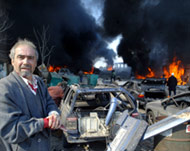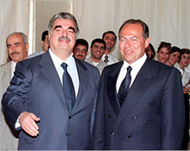Profile: Rafiq al-Hariri
Rafiq al-Hariri was Lebanon’s prime minister who tried to transform the country from the ruins of civil war.

Born to a modest family from the southern port city of Sidon on 1 November 1944, al-Hariri went to Saudi Arabia when he turned 18 to carve a career. After years of working various jobs, al-Hariri founded his first construction company in the early 1970s.
In 1977, he struck gold when he took up the challenge of building in just six months a palace for the late Saudi king Khalid in the resort of Taif before an Islamic summit, as a sub-contractor for Oger, an affiliate of a French group.
Al-Hariri won the confidence of then-crown prince Fahd, now Saudi Arabia’s king, and was awarded the rare privilege of Saudi nationality.
He then went on to become Saudi Arabia’s leading entrepreneur, acquiring Oger in 1979 and founding Oger International, based in Paris.
Vast empire
 |
|
A massive car bomb killed |
Al-Hariri’s interests extended across banking, real estate, oil, industry and telecommunications.
He founded a television station, Future TV, in Beirut and purchased stakes in several Lebanese newspapers.
He was the biggest shareholder in Solidere, the joint-stock company that sent bulldozers to revive central Beirut after Lebanon’s 15-year civil war.
But politics remained a fixation for the burly businessman. In 1982, he donated $12 million to Lebanese victims of Israel’s devastating invasion and helped clean up Beirut streets with his own money.
Al-Hariri also used his personal wealth to finance the Taif national reconciliation accords in 1989 which put an end to the civil war.
Fighting politician
A Sunni Muslim, he was first named prime minister at the relatively young age of 48 in 1992 when Lebanon was desperately seeking a saviour to help the country emerge from the destruction of the war.
Despite many setbacks, al-Hariri was regarded as the great political survivor; he remained in office for most of the past 12 years, heading five governments, before stepping down in October 2004 amid a bitter rift with President Emile Lahud.
His resignation came as Lebanon appeared to be in real need for his international contacts to deal with a UN Security Council resolution demanding an end to Syria’s military and political roles in Lebanon.
Al-Hariri, political sources say, first contemplated quitting office minutes after he was told by Syrian President Bashar al-Asad in August that Damascus wanted to extend the term in office of his rival Lahud.
Having fallen in and out of favour with Damascus over the years, he had recently joined calls by the opposition for Syrian troops to quit Lebanon in the run-up to a general election in May.
Chequered career
Friction with Lahud helped chase al-Hariri from office in 1998 amid accusations he neglected the country’s poor. It hobbled the prime minister’s efforts to handle Lebanon’s debt that exploded during the post-war reconstruction project he spearheaded.
 |
|
Al-Hariri and Lahud were rivals |
The Sunni Muslim was back in power in 2000 after a landslide election victory as many Lebanese saw no alternative to reversing an economic slide that worsened in his absence.
But optimism about the businessman’s ability to resurrect Lebanon as a financial and tourism hub was tempered by the mounting number of battles fought with Lahud loyalists over privatisation and other cost-cutting plans.
When Lebanon faced a financial crisis in 2002, al-Hariri persuaded France to host an international summit of lenders who pledged enough cash to avert a meltdown.
Business links
The construction tycoon’s ties with European, Asian and Arab leaders helped keep Lebanon out of an abyss of debt run up during efforts to rebuild Beirut, including an expensive downtown area that rose from the ruins to become top-end property hawked by a company al-Hariri largely owned.
Businessmen praised him for cutting through a paralysed Lebanese state bureaucracy and rebuilding war-shattered Beirut.
But hopes that an economic renaissance would flower with a Middle East peace process wilted with it instead.
He was married twice and had seven children.